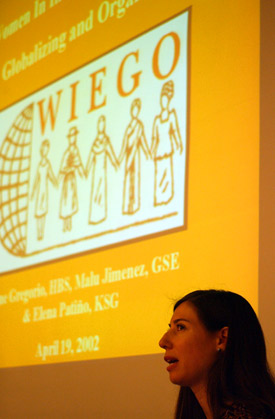Gender transcends disciplines
GSE conference looks at range of gender-related issues

From street vendors in India to fighter pilots in the U.S. Air Force, from teen pregnancy to religious asceticism, issues of gender united academics from around Harvard Friday (April 19) in an unusual cross-disciplinary conference.
Hosted by the Graduate School of Education (GSE), the Forum on Gender Across the Disciplines at Harvard University focused studies and activities from six Harvard schools on one day of sharing and cross-pollinating.
“It’s really important to confirm to people that people throughout Harvard are interested in gender and to give people a chance to exchange experiences and dialogue and hopefully promote future interdisciplinary work,” said Caroline Richard, an Ed.M. candidate at the GSE and one of nine students in the HGSE Global Gender Student Interest Group, which organized the forum.
Funding came from the Office of the Provost, the Center on Gender and Education, the GSE Office of Student Affairs, Women in Technology, and the Kennedy School of Government’s Women and Public Policy Program and Women in Informal Employment: Globalizing and Organizing (WIEGO).
Suzanne Grant Lewis, GSE assistant professor of education, welcomed participants, who came from around the University and the community. “Many now share the view – but it’s still not widely shared – that attending to gender disparities is critical to the overall pursuit of economic and social justice,” she said.
Swanee Hunt, director of the Women and Public Policy Program at the Kennedy School (KSG) and former U.S. ambassador to Austria, delivered a lunchtime keynote address. In the morning and afternoon, students from the GSE, KSG, the Divinity School, and the Business School as well as Harvard College and the Graduate School of Arts and Sciences (GSAS) presented papers and projects on a variety of gender-related issues.
Organizing the informal economy
While several panelists offered academic studies, others were less formal. The “Women in Informal Employment: Globalizing and Organizing” panel introduced the work of the organization of the same name, a worldwide coalition based at the KSG that is concerned with improving the status of women in the economy’s informal sector.
“The majority of low-income women in developing countries work in the informal economy,” said Elena Patiño, manager of WIEGO. The informal economy, she explained, comprises such industries as home-based electronics assembly, garment piece-rate work, crafts, and street vendors. It’s a major source of nonagricultural employment in developing nations, she said, and its workers are largely women.
Despite its robust status and its inextricable links to the formal economy, the informal economy, Patiño said, is largely invisible. “We want to put statistics in the hands of those who are lobbying for workers,” she said of WIEGO’s goals.
GSE student Malu Jimenez introduced the work of SEWA, a trade union of self-employed women in India founded by Ela Bhatt, who received an honorary degree from Harvard in 2001. The membership-based organization advocates for full employment and self-reliance of its members.
Panel moderator and HBS student Diane Gregorio brought her studies in sociology and organizational behavior to bear on the issue of informal economy. “SEWA, as a national grassroots membership-based women’s organization, for them to have the vision to understand that they needed to work globally, then to be the catalyzing force for organizing these international networks is quite remarkable,” she said.
A few good women
Demonstrating the breadth of issues discussed at the forum, three first-year HBS students – Amanda Krantz, Kelli McKechnie, and Amanda Morris – shared their experience in the armed forces on the “Gender Issues in the Military” panel.
While their paths and services were different, their experiences were unanimously positive. Krantz attended the Air Force Academy then worked in the civilian world, at space contractor Lockheed Martin. Morris graduated from Duke University, where she participated in the Reserve Officer Training Corps (ROTC) before pursuing a career with the Navy Civil Engineering Corps. McKechnie graduated from West Point, which she described as “a really good way to pay for school and an excellent education.”
While some gender-based prohibitions remain in all branches of the military, the panelists said, the past decade has been marked by major advances for women. The 1993 repeal of the combat aircraft and combatant ship exclusions for women was a major milestone, as it allowed women to be exposed to areas that would help them climb the ranks.
Although the representation of women in the military remains small, only about 13 percent, the panelists agreed that the military provides a better climate for women than other industries.
“The issues of women in the military are really not all that different from the way they are any place where there aren’t very many women,” said Krantz, citing her own experience at the male-dominated Lockheed Martin. The military, as a taxpayer-funded employer, is held to a higher standard that strictly mandates equal treatment for women. “I felt that being a woman in the military offered me more advantages than on the outside,” she said.
“I would recommend to anyone to go into the military,” said McKechnie, crediting her personal development and professional leadership to the experience. Glancing around the audience, she added, “I don’t know if I’m going to sign anyone up here.”




